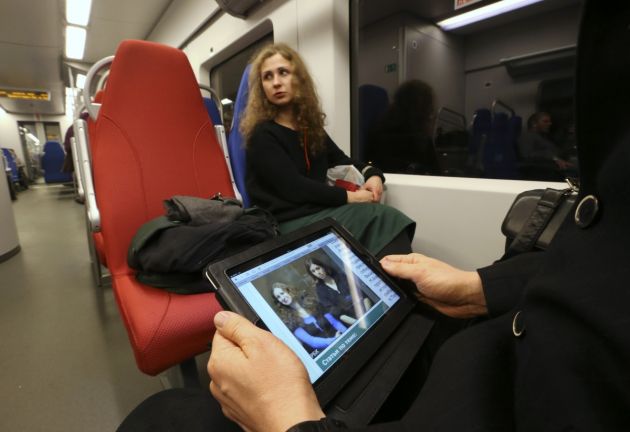Amnestied Pussy Riot pair criticise Putin after release

KRASNOYARSK/NIZHNY NOVGOROD, Russia (Reuters) - Two members of Russian punk protest band Pussy Riot freed from prison on Monday derided President Vladimir Putin's amnesty that led to their early release as a propaganda stunt and promised to fight for human rights.
Nadezhda Tolokonnikova, 24, shouted "Russia without Putin" following her release from a Siberian prison, hours after band mate Maria Alyokhina, 25, was freed from jail in the Volga River city of Nizhny Novgorod.
The women had two months left to serve but walked free days after a pardon from Putin freed former oil tycoon Mikhail Khodorkovsky eight months before the end of his more than 10-year jail term, decisions widely seen as intended to improve Russia's image before it hosts the Winter Olympics in February.
"It is a disgusting and cynical act," Tolokonnikova, looking relaxed in a black coat and chequered shirt, told Reuters at her grandmother's apartment building in the snowbound Siberian city of Kransoyarsk where she was jailed.
Tolokonnikova and Alyokhina were sentenced to two years in prison for a profanity-laced protest against Putin in a Russian Orthodox church in 2012 after a trial Kremlin critics said was part of a clampdown on dissent in his third presidential term.
They were jailed for performing a crude "punk prayer" against Putin and his ties to the Russian Orthodox church in Moscow's main cathedral.
The case caused an outcry in the West, but there was much less sympathy for the women at home than abroad. They had been due for release in early March.
Putin, who denies jailing people for political reasons, has said the amnesty would show that the Russian state is humane.
The measure, however, does not benefit opposition leader Alexei Navalny, who is barred from elections for years by a five-year suspended sentence on a theft charge he says was Kremlin revenge for his activism. Putin, in power since 2000, has not ruled out seeking another six-year term in 2018.
Alyokhina echoed critics who said the amnesty was far too narrow and not an act of mercy but a political ply by Putin.
"I do not think it is a humanitarian act, I think it is a PR stunt," she said in comments to the Russian Internet and TV channel Dozhd. "My attitude to the president has not changed."
Tolokonnikova, who staged a hunger strike earlier this year and drew attention to stark conditions and long hours of mandatory labour in the jail where she was previously held, said she would fight for prisoners' rights.
"Everything is just starting, so fasten your seat belts," she said, suggesting Pussy Riot - jailed for a "punk prayer" in the main cathedral of Russia's dominant faith - would continue to use attention-grabbing protests to make their point.
"We will unite our efforts in our human rights activity," Alyokhina said in Nizhny Novgorod. "We will try to sing our the song to the end."
"I'M NOT AFRAID"
Bundled in a thick green prison jacket and with her long curly hair loose, Alyokhina said she would have rejected the amnesty if that been a option. She said she wants to focus on fighting for the rights of those still behind bars.
"I'm not afraid of anything anymore, believe me," she said.
In an about-face, Putin unexpectedly pardoned Khodorkovsky, the former Yukos oil company chief who had been in jail since his arrest in 2003 and conviction in two trials that critics said were punishment for challenging the Kremlin leader.
Khodorkovsky, who was freed on Friday and flown to Germany, said Putin is seeking to improve his image while also showing that he is confident in his grip on power after weathering large opposition protests and winning a third term last year.
Putin wants to send "a signal to society and the world that he feels secure and is not afraid", said Khodorkovsky, who supporters feared would remain in jail throughout Putin's tenure, in an interview with Russian magazine the New Times.
The amnesty is also expected to spare from trial 30 people arrested after a Greenpeace protest against Arctic oil drilling. They face charges punishable by up to seven years' in jail.
A pro-Kremlin lawmaker said he thought the amnesty and pardon would help to remove irritants in ties with the West.
"Political grievances against Russia will shrink somewhat," Alexei Pushkov, chairman of the international affairs committee in Russia's parliament, said.
But Putin has said the amnesty was not drafted with the Greenpeace activists or Pussy Riot in mind. In an annual news conference last week, he described Pussy Riot's protest as disgraceful, saying it "went beyond all boundaries".
Rights activists have estimated the amnesty will free fewer than 1,500 of the 564,000 convicts in Russian prisons. Another 114,000 people are in pre-trial detention, the government says.
A third Pussy Riot member, Yekaterina Samutsevich, was freed last year when a judge suspended her sentence on appeal.
(Additional reporting by Alissa de Carbonnel; Writing by Steve Gutterman and Alissa de Carbonnel; Editing by Alistair Lyon)
